Horns Read online
Page 6
“Mother,” he said.
“When you talk, I want to sing!” she shouted, and let go of her briefcase and clapped her hands over her ears. “Lalala-la-la-la! When you talk, I don’t want to hear it. I want to hold my breath until you go away.”
She took a great swallow of air and held her breath, her cheeks popping out.
He crossed the room to her and sank down before her, where she would have to look at him. She crouched with her hands over her ears and her mouth squeezed tight. He took her briefcase and began to put her papers into it.
“Is this how you always feel when you see me?”
She nodded furiously, her eyes bright and staring.
“Don’t suffocate yourself, Mom.”
His mother stared at him for a moment longer, then opened her mouth and drew a deep, whistling breath. She watched him put her papers into her bag.
When she spoke, her voice was small and shrill and rapid, words running together. “I want to write you a letter a very nice letter with very nice handwriting on my special stationery to tell you how much Dad and I love you and how sorry we are you aren’t happy and how much better it would be for everyone if you’d just go.”
He put the last of her papers into her briefcase and then squatted there, holding it across his knees. “Go where?”
“Didn’t you want to hike in Alaska?”
“With Merrin.”
“Or see Vienna?”
“With Merrin.”
“Or learn Chinese? In Beijing?”
“Merrin and I talked about going to Vietnam to teach English. But I don’t think we were ever really going to do it.”
“I don’t care where you go. As long as I don’t have to see you once a week. As long as I don’t have to hear you talk about yourself like everything’s okay, because it’s not okay, it’s never going to be okay again. It makes me too unhappy to see you. I just want to be happy again, Ig.”
He gave her the briefcase.
“I don’t want you to be my kid anymore,” she said. “It’s too hard. I wish I just had Terry.”
He leaned forward and kissed her cheek. And when he did, he saw how she had quietly resented him for years for giving her stretch marks. He had single-handedly spoiled her Playboy-centerfold figure. Terry had been a small baby, considerate, and left her shape and skin intact, but Ig had fucked it all up. She had been offered five grand for a single night by an oil sheik in Vegas once, back before she had children. Those were the days. Easiest and best money she ever made.
“I don’t know why I told you all that,” Lydia said. “I hate myself. I was never a good mother.” Then she seemed to realize she had been kissed, and she touched her cheek, smoothing one palm across it. She was blinking back tears, but when she felt the kiss on her skin, she smiled. “You kissed me. Are you…are you going to go away, then?” Her voice unsteady with hopefulness.
“I was never here,” he said.
CHAPTER EIGHT
WHEN HE WAS BACK in the front hallway, he looked at the screen door to the porch and the sunlit world beyond and thought he ought to go, go now, get out of here before he ran into someone else, his father or his brother. He had changed his mind about looking for Terry, had decided to avoid him after all. Considering the things his mother had said to him, Ig thought it was better not to test his love for anyone else.
Yet he did not walk back out through the front door but instead turned and began to climb the stairs. He was here, he thought, he should look in his room and see if there was anything he wanted to take with him when he left. Left for where? He didn’t know yet. He wasn’t sure, though, that he would ever be coming back.
The stairs were a century old and creaked and muttered as Ig climbed. No sooner had he reached the top of them than a door across the hall, to the right, popped open, and his father stuck out his head. Ig had seen this a hundred times before. His father was distractible by nature and couldn’t stand for anyone to go by on the stairs without looking out to see who it was.
“Oh,” he said. “Ig. I thought you might be…” but his voice trailed off. His gaze drifted from Iggy’s eyes and on to the horns. He stood there in a white wifebeater and striped suspenders, his feet bare.
“Just tell me,” Ig said. “Here’s the part where you tell me something awful you’ve been keeping to yourself. Probably something about me. Just say it, and we’ll get it out of the way.”
“I want to pretend I was doing something important in my studio so I don’t have to talk to you.”
“Well. That’s not so bad.”
“Seeing you is too hard.”
“Gotcha. Just covered all this with Mom.”
“I think about Merrin. About what a good girl she was. I loved her, you know, in a way. And envied you. I was never in love with anyone the way you two were in love with each other. Certainly not your mother—status-obsessed little whore. Worst mistake I ever made. Every bad thing in my life has come out of my marriage. But Merrin. Merrin was the sweetest little thing. You couldn’t hear her laugh without smiling. When I think about the way you fucked her and killed her, I want to throw up.”
“I didn’t kill her,” Ig said, dry-mouthed.
“And the worst part,” Derrick Perrish said, “she was my friend and looked up to me, and I helped you get away with it.”
Ig stared.
“It was the guy who runs the state forensics lab, Gene Lee. His son died of leukemia a few years back, but before he croaked, I helped him get tickets to Paul McCartney and arranged for Gene and his kid to meet him backstage and everything. After you were arrested, Gene got in touch. He asked me if you did it, and I said—I told him—that I couldn’t give him an honest answer. And two days later there was that fire in the state lab up in Concord. Gene wasn’t in charge there—he works out of Manchester—but I’ve always assumed…”
Ig felt his insides turn over. If the forensic evidence gathered from the scene had not been destroyed, it might’ve been possible to establish his innocence. But it had gone up in flames—like every other hope Ig held in his heart, like every good thing in Ig’s life. In paranoid moments he had imagined there was an elaborate and secret conspiracy to condemn and destroy him. Now he saw he was right, there had been a secret agency at work, only it had been a conspiracy of people who wanted to protect him.
“How could you have done that? How could you have been so stupid?” Ig asked, breathless with a shock that wavered on the edge of hate.
“That’s what I ask myself. Every day. I mean, when the world comes for your children, with the knives out, it’s your job to stand in the way. Everyone understands that. But this. This. Merrin was like one of my kids, too. She was in our house every day for ten years. She trusted me. I bought her popcorn at movies and went to her lacrosse games and played cribbage with her, and she was beautiful and loved you, and you bashed her fuckin’ brains in. It wasn’t right to cover for you, not for that. You should’ve gone to jail. When I see you in the house, I want to slap that morose look right off your stupid face. Like you have anything to be sad about. You got away with murder. Literally. And dragged me into it. You make me feel unclean. You make me want to wash, scrub myself with steel wool. My skin crawls when you talk to me. How could you do that to her? She was one of the best people I ever knew. She was sure as shit my favorite thing about you.”
“Me, too,” Ig said.
“I want to go back into my office,” his father said, his mouth open, breathing heavily. “I see you and I just want to go away. Into my office. Off to Vegas. Or Paris. Anywhere. I’d like to go and never come back.”
“And you really think I killed her. You don’t sometimes wonder if maybe the evidence you had Gene burn up could’ve saved me? All the times I told you I didn’t do it, you didn’t sometimes think maybe—just maybe—I was innocent?”
His father stared, for a moment couldn’t reply. Then he said, “No. Not really. Tell the truth, I was surprised you didn’t do something to her sooner. I alway
s thought you were a weird little shit.”
CHAPTER NINE
HE STOOD IN THE DOORWAY of his bedroom for a full minute but did not enter the room, didn’t lie down, as he had imagined doing. His head hurt again, in the temples, at the base of the horns. There was a feeling of pressure mounting behind them. Darkness twitched at the edges of his vision, in time to the beat of his pulse.
More than anything, he wanted rest, wanted no more madness. He wanted the touch of a cool hand on his brow. He wanted Merrin back—wanted to cry with his face buried in her lap and her fingers moving over the nape of his neck. All thoughts of peace were wrapped up in her. Every restful memory seemed to include her: A breezy July afternoon, lying in the grass above the river. A rainy October, drinking cider with her in her living room, huddled together under a knitted blanket, Merrin’s cold nose against his ear.
He cast his gaze around the room, considering the detritus of the life he’d lived here. He spied his old trumpet case, sticking out a little from under the bed, and picked it up, set it on the mattress. Within was his silver horn. It was tarnished, the keys worn smooth, as if it had seen hard use.
It had. Even once he knew that his weak lungs would not allow him to play the trumpet—ever—Ig had, for reasons he no longer understood, continued to practice. After his parents sent him to bed, he would play in the dark, lying on his back under the sheets, his fingers flying over the keys. He played Miles Davis and Wynton Marsalis and Louis Armstrong. But the music was only in his head. For while he placed the mouthpiece to his lips, he did not dare blow, for fear of bringing on a wave of light-headedness and a storm of black snow. It seemed now an absurd waste of time, all that practice to no useful end.
He emptied the case onto the floor in a sudden convulsion of fury, cast out the trumpet, and the rest of his horn paraphernalia—leadpipes and valve oil, spare mouthpiece—chucking it all. The last thing he grabbed was a mute, a Tom Crown, a thing that looked like a great Christmas ornament made out of brushed copper. He meant to launch it across the room, and he even made the throwing motion, but his fingers wouldn’t open, wouldn’t allow it to be flung. It was a beautiful piece of metalwork, but that wasn’t why he held on to it. He didn’t know why he held on to it.
What you did with a Tom Crown, you shoved it down into the bell of the horn to choke off the sound; if used properly, it produced a lascivious, hand-up-the-skirt squall. Ig stared down at it now, frowning, an imperceptible something tugging at his consciousness. It wasn’t an idea, not yet. It wasn’t even half an idea. It was a drifting, confused notion. Something about horns. Something about the way they were played.
Finally Ig set the mute aside, turned again to the trumpet case. He pulled out the foam padding, packed in a change of clothes, then went looking for his passport. Not because he thought he was leaving the country but because he wanted to take everything that was important with him, so he wouldn’t have to come back later.
His passport was tucked into the fancy-pants Bible in the top drawer of his dresser, a King James with a white leather cover and the words of Jesus printed in gold. Terry called it his Neil Diamond Bible. He had won it as a child, playing Scriptural Jeopardy in his Sunday-school class. When faced with answers from the Bible, Ig had all the right questions.
Ig picked his passport out of the Good Book, then paused, looking at a column of dots and lines in blurred pencil scrawled on the endpapers. It was a key to Morse code. Ig had copied it into the back of the Neil Diamond Bible himself, more than ten years before. He once believed that Merrin Williams had sent him a message in Morse code, and he spent two weeks working out a reply to be sent the same way. The response he had come up with was still scribbled there in a string of circles and dashes: his favorite prayer in the book.
He threw the Bible into the trumpet case as well. There had to be something in there, some useful tips for his situation, a homeopathic remedy you could apply when you came down with a bad case of the devil.
It was time to go, to get out before he saw anyone else, but at the bottom of the stairs he noticed how dry and tacky his mouth felt and that it was painful to swallow. Ig detoured into the kitchen and drank from the sink. He cupped his hands together and splashed water into his face and then held the sides of the sink with his face dripping and shook himself like a dog. He rubbed his face dry with a dish towel, enjoying the rough feel of it against his raw, cold-shocked skin. At last Ig tossed down the towel and turned, to find his brother standing behind him.
CHAPTER TEN
TERRY LEANED AGAINST THE WALL, just inside the swinging door. He didn’t look so well—the jet lag, maybe. He needed a shave, and his eyelids had a puffy, swollen look, as if he were suffering from allergies. Terry was allergic to everything—pollen, peanut butter; he had once nearly died of a bee sting. His black silk shirt and tweed slacks hung loose on his frame, as if he had lost weight.
They regarded each other. Ig and Terry had not been in the same room together since the weekend Merrin had been killed, and Terry hadn’t looked much better then, had been inarticulate with grief for her, and for Ig. Terence had left for the West Coast shortly after—supposedly for rehearsals, although Ig suspected he’d been summoned for a damage-control meeting with the execs at Fox—and had not been back since, and no surprise. Terry had not much cared for Gideon even before the murder.
Terry said, “I didn’t know you were here. I didn’t hear you come in. Did you grow horns? While I was gone?”
“I thought it was time for a new look. Do you like them?”
His brother shook his head. “I want to tell you something,” Terry said, and his Adam’s apple jugged up and down in his throat.
“Join the club.”
“I want to tell you something, but I don’t want to tell you. I’m afraid.”
“Go ahead. Spill it. It probably isn’t so bad. I don’t think anything you could have to say would bother me much. Mom just told me she never wants to see me again. Dad told me he wishes I had gone to jail forever.”
“No.”
“Yes.”
“Oh, Ig,” Terry said. His eyes were watering. “I feel so bad. About everything. About how things turned out for you. I know how much you loved her. I loved her, too, you know. Merrin. She was a hell of a kid.”
Ig nodded.
“I want you to know…” Terry said in a choked voice.
“Go ahead,” Ig said gently.
“I didn’t kill her.”
Ig stared, a pins-and-needles sensation beginning to spread across his chest. The thought that Terry might have raped and killed her had never crossed his mind, was impossible.
Ig said, “Of course you didn’t.”
“I loved you two guys and wanted you to be happy. I never would’ve done anything to hurt her.”
“I know that,” Ig said.
“And if I had any idea Lee Tourneau was going to kill her, I would’ve tried to stop it,” Terry said. “I thought Lee was her friend. I’ve wanted to tell you so bad, but Lee made me keep quiet. He made me.”
“EEEEEEEEEE,” Ig screamed.
“He’s awful, Ig,” Terry said. “You don’t know him. You think you do, but you don’t have any idea.”
“EEEEEEEEEEEE,” Ig went on.
“Lee fixed you and me both, and I’ve been in hell ever since,” Terry said.
Ig fled into the hallway, ran through the dark for the front door, slammed through the screen, stumbled out into the sudden blinding glare of day, eyes blurring with tears, missed the steps, fell into the yard. He picked himself up, gasping. He had dropped his trumpet case—had hardly even been aware he was still carrying it—and he snatched it back up out of the grass.
He lurched across the lawn, barely looking where he was going. The corners of his eyes were damp, and he thought he might be crying, but when he touched his fingers to his face, they came away bloody. He lifted his hands to his horns. The points had ruptured through the skin, and blood was trickling down his face. He was aware
of a steady throbbing in the horns, and although there was a feeling of soreness in them, there was also a kind of nervous thrill shooting through his temples, a sensation of release not unlike orgasm. He staggered along, and from his mouth poured a stream of curses, choked obscenities. He hated how hard it was to breathe, hated the sticky blood on his cheeks and hands, the too-bright blue sky, the smell of himself, hated, hated, hated.
Lost in his own head, he didn’t see Vera’s wheelchair until he had almost crashed into it. He pulled up short, staring down at her. She had dozed off again, a soft snore burring in her nostrils. She was smiling faintly, as at some pleasant, dreamy thought, and the look of peace and happiness on her face made Ig’s stomach roil with fury. He stomped on the brake on the back of her wheelchair and gave it a shove.
“Bitch,” he said as it began to roll forward, down the hill.
She lifted her head from her shoulder, put it back, then lifted it again, stirring weakly. The wheelchair thudded through the green, groomed grass, one wheel hitting a rock, juddering over it, going on, and Ig thought of being fifteen, the day he’d ridden the shopping cart down the Evel Knievel trail: the essential turning point of his life, really. Had he been going this fast then? It was something, the way the wheelchair picked up speed, the way a person’s life picked up speed, the way a life was like a bullet aimed at one final target, impossible to slow or turn aside, and like the bullet, you were ignorant of what you were going to hit, would never know anything except the rush and the impact. Vera was probably doing forty when she hit the fence at the bottom.
Ig walked on toward his car, breathing easily again, the tight, pinched feeling behind his breastbone gone as quickly as it had come. The air smelled of fresh grass, warmed in the late August sun, and the green of the leaves. Ig didn’t know where he was going next, only that he was going. A garter snake slithered across the lawn behind him, black and green and wet-looking. It was joined by a second, and then a third. He didn’t notice.

 The Fireman
The Fireman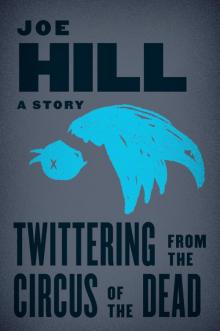 Twittering From the Circus of the Dead
Twittering From the Circus of the Dead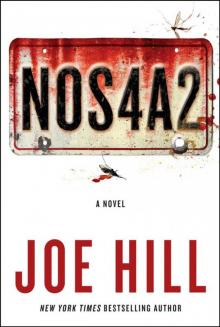 Nos4a2
Nos4a2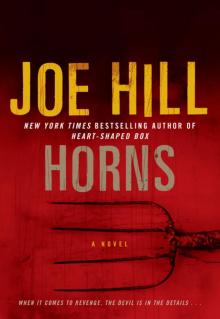 Horns
Horns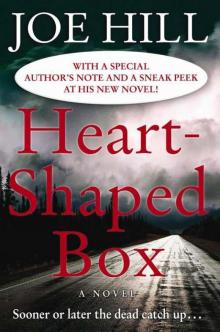 Heart-Shaped Box
Heart-Shaped Box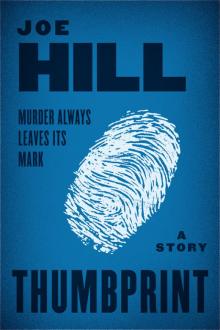 Thumbprint: A Story
Thumbprint: A Story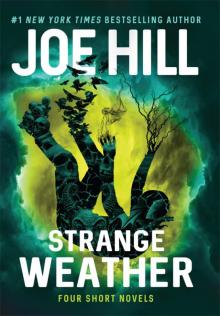 Strange Weather
Strange Weather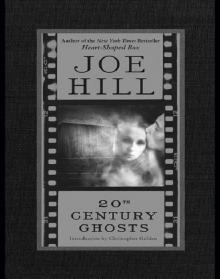 20th Century Ghosts
20th Century Ghosts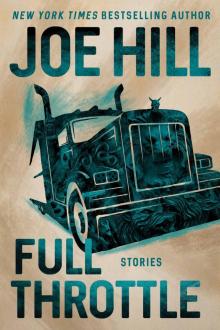 Full Throttle
Full Throttle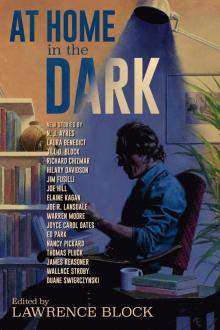 At Home in the Dark
At Home in the Dark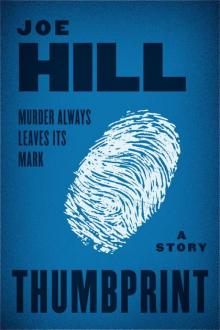 Thumbprint
Thumbprint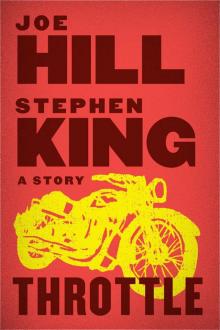 Throttle
Throttle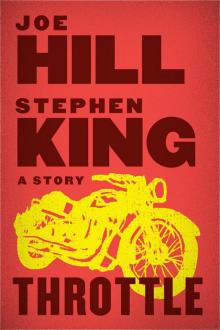 Throttle (Kindle Single)
Throttle (Kindle Single)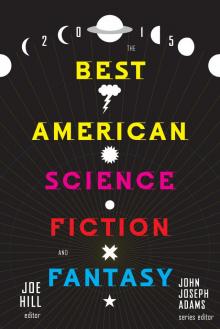 The Best American Science Fiction and Fantasy 2015
The Best American Science Fiction and Fantasy 2015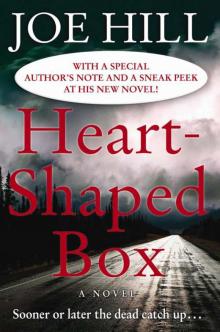 Heart-Shaped Box with Bonus Material
Heart-Shaped Box with Bonus Material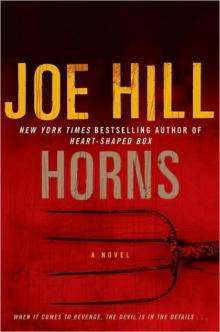 Horns: A Novel
Horns: A Novel